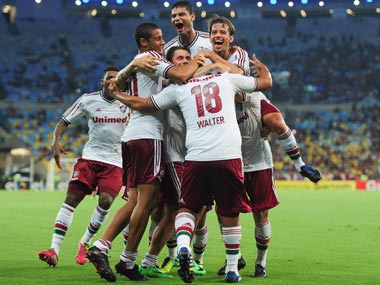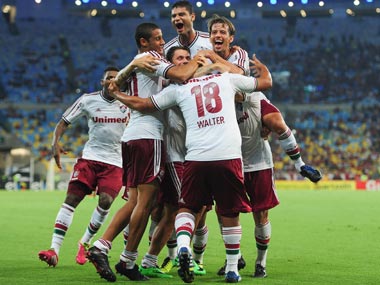Rio de Janeiro: A new plan to bring professional Brazilian football players to Indian teams is in the works by Rio de Janeiro’s Fluminense FC. Fluminense is looking for Indian teams to train and use their recently graduated players for an exchange programme in an effort to stimulate the football business in India and be the first academy to arrive in what they believe will be a promising landscape. Fluminense already has exchange deals with teams from the United States, China and Europe where over-18s are sent to experience different types of training and culture, adding to their value in the football market. On average, over 10 professional players graduate from the Fluminense academy every year. Those who do not make it into the main professional team have the option of playing in international teams to gain visibility and value which sometimes results in the sale of the player to the team they have played for during the exchange. If the player is not bought he returns to Brazil and continues to play and train in Fluminense but his value has soared by his international experience which increases his chance of being sold to a smaller team. [caption id=“attachment_1394455” align=“alignleft” width=“380”]
 Fluminense already has exchange deals with teams from the United States, China and Europe. Getty Images[/caption] General Football Director Marcelo Teixeira, who runs the programme, feels that tapping into India’s football market is the logical next step in the academy’s plans. “There will be [a football market in India],” he said confidently when asked if it was worth getting into such an uncharted territory. “Brazil is an inexhaustible source of talent.” “We have a large number of players in our academy and we have the resources and capacity to recruit more athletes in case of the possibility of getting more partners who can take these athletes,” he continued. “Football is a global sport that is growing in emergent markets like the United States and India. Certainly, this will happen in India and Fluminense can help and contribute to that.” The athletes’ ages will range in between 18 and 22. The salaries would be paid by the Indian teams who would benefit from Brazilian players for a low price. In turn, Fluminense will be expanding its business abroad and adding value to the professional players they cannot accommodate at home. “The Indian team will pay the salary and loan the player for a year for free. In case they want to keep the player after a year, they will pay a price (according to Indian market standards) for a new loan or to keep the player definitely", said Teixeira. “An unmeasurable benefit [of the scheme] is the internationalization of the Fluminense brand and the gain of new supporters.” When asked if Fluminense graduates would want to come to India to play despite the small size of the Indian football market, Teixeira said: “I can ensure that if it is a team with a good infrastructure to offer the athletes a chance of playing for their main team, they will certainly be interested.” Fluminense also wants to give back to their future partners by taking in Indian players to train in Brazil. Teixeira said: “Fluminense wishes to offer the partner clubs the opportunity of sending their athletes and managers to Brazil for an exchange programme period in our academy, paying a daily fee that would cover training, accommodation and food.” He revealed he has spoken to a few people who seemed interested in partnering up but that so far nothing is concrete and they are still studying the Indian football market. “We are still looking for a football club that is interested,” he said. “We do not have a deep knowledge of the market [to know which league we are interested in].” Ultimately, Fluminense’s objective is to have their main professional team comprised by 50% in-house trained players and this programme is designed to achieve this goal.
Fluminense already has exchange deals with teams from the United States, China and Europe. Getty Images[/caption] General Football Director Marcelo Teixeira, who runs the programme, feels that tapping into India’s football market is the logical next step in the academy’s plans. “There will be [a football market in India],” he said confidently when asked if it was worth getting into such an uncharted territory. “Brazil is an inexhaustible source of talent.” “We have a large number of players in our academy and we have the resources and capacity to recruit more athletes in case of the possibility of getting more partners who can take these athletes,” he continued. “Football is a global sport that is growing in emergent markets like the United States and India. Certainly, this will happen in India and Fluminense can help and contribute to that.” The athletes’ ages will range in between 18 and 22. The salaries would be paid by the Indian teams who would benefit from Brazilian players for a low price. In turn, Fluminense will be expanding its business abroad and adding value to the professional players they cannot accommodate at home. “The Indian team will pay the salary and loan the player for a year for free. In case they want to keep the player after a year, they will pay a price (according to Indian market standards) for a new loan or to keep the player definitely", said Teixeira. “An unmeasurable benefit [of the scheme] is the internationalization of the Fluminense brand and the gain of new supporters.” When asked if Fluminense graduates would want to come to India to play despite the small size of the Indian football market, Teixeira said: “I can ensure that if it is a team with a good infrastructure to offer the athletes a chance of playing for their main team, they will certainly be interested.” Fluminense also wants to give back to their future partners by taking in Indian players to train in Brazil. Teixeira said: “Fluminense wishes to offer the partner clubs the opportunity of sending their athletes and managers to Brazil for an exchange programme period in our academy, paying a daily fee that would cover training, accommodation and food.” He revealed he has spoken to a few people who seemed interested in partnering up but that so far nothing is concrete and they are still studying the Indian football market. “We are still looking for a football club that is interested,” he said. “We do not have a deep knowledge of the market [to know which league we are interested in].” Ultimately, Fluminense’s objective is to have their main professional team comprised by 50% in-house trained players and this programme is designed to achieve this goal.
Journalist, blogger and Brazilian. Nicole writes regularly about politics, culture, current events, feminism and pop culture. She is an avid Twitter user and doesn't shy away from speaking her mind.
)